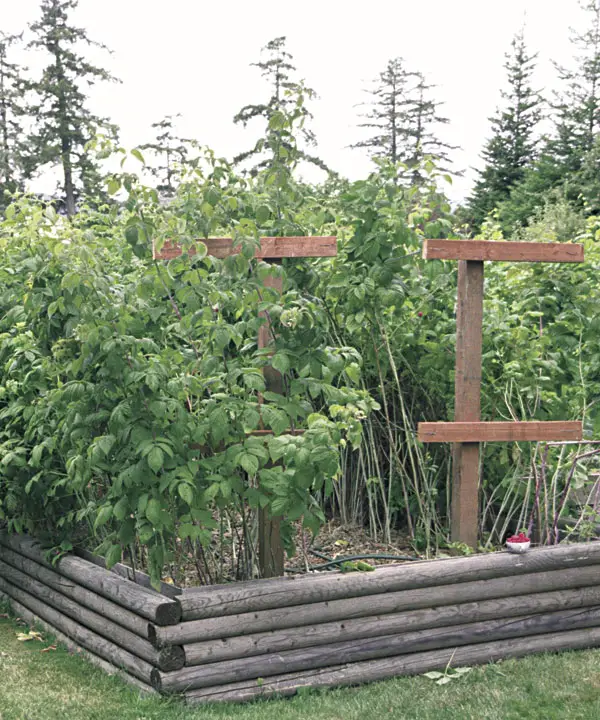What a great idea of getting fresh and juicy raspberries from your growing area. These little nuggets of sweetness fill my mouth with water whenever I see them. In this article, we will give you all the tips and instructions for growing raspberries in a raised bed.
Raspberry plants are perennials so you should grow them separately from the annuals. With little care and maintenance raspberries plants produce fruits year after year.
This is the best option to grow raspberries in a raised bed because it has many benefits. If you want to avoid pests and weeds then you should grow these sweet treasures in a raised bed. There is only one drawback of growing raspberries in raised beds which is its cost.
But if you build a raised bed then there is no disadvantage. Little DIY skills will make you able to build a raised bed. The size of the raised bed is according to the space you have but keep in mind the width of the raised bed should be no more than 3 feet because you can’t maintain the plants if you build a more wide raised bed.
WHY A RASPBERRY RAISED BED?
If you want a productive and efficient home garden, grow plants in raised beds. You can grow more plants in limited space if you build or buy a raised bed. The following are the reasons for growing raspberry plants in a raised bed.
1- REDUCE THE POPULATION OF WEEDS AND PESTS
If you raise the planting level from the ground then the number of weeds and pests will reduce. Weeds are thieves which steal all the nutrients from the soil and your plants will not grow well under these threats.
It’s not good for plants to fight for the nutrients. In the same way, pests are a great danger for your raspberry plants. They attack the base of your plants so you can add hardware cloth at the bottom of the raised bed to prevent your plants from these little monsters
And at the same time weeds which are unwanted plants. If you grow plants above the ground level then you can avoid pests and weeds.
2- YOU BECOME IN-CHARGE OF THE SOIL
If the soil of your yard or growing area is not productive one then you will not get high production of raspberries from your plants. You can maintain the fertility level of the soil by growing plants in the raised bed.
When you grow plants in raised beds then you are responsible for providing all the nutrients to the soil. Soil is a medium for providing all the major organic materials to the plants.
Amend your soil with all basic organic matters. The pH of the soil must be between 6.0 to 6.2 so the raspberries plant grows best.
3- LIMIT YOUR RASPBERRY PLANTS
If you grow raspberries plants in the ground then the roots of the raspberries spread. This situation can be problematic because raspberries will fight for space with other plants.
So the best way of avoiding this problem is to grow in a raised bed. The raspberry plants will grow in a limited area in the boundary of the raised bed and will not disturb other plants.
4- SOIL GET WARM QUICKLY
If you grow plants in the ground then you can’t grow plants earlier but raised beds make it possible to grow early. You can start the growing season earlier because the soil in the raised bed will warm quickly as compared to the soil of the ground which takes time to become warm.
Choose the spot for your raised bed where it gets full sun exposure so the soil will get warmth. Brick and galvanized steel raised beds to absorb more warmth than wooden beds. After growing in such raised beds you will get a chance to harvest earlier.
BEST VARIETIES OF RASPBERRIES

If you have limited space then choose varieties that grow in small areas. Choosing the right variety is not an easy task because you have to keep in your mind many things before deciding.
When raspberry plants establish then they can produce fruit for 10-15 years. You have to choose two categories which are summer bearing and everbearing. Summer-bearing varieties produce fruit in June or July.
The other name of this variety is June bearing. This variety has weak canes that’s why it needs proper support. Everbearing produce fruit in the fall, this variety does not need any support because of its shorter stature with sturdy canes. Here we are giving you some best options of raspberry varieties.
BOYNE
This is a summer-bearing variety that gives you red fruit with a sweet flavor. It is a disease-resistant variety. The height of the canes can be 3-4 feet when mature. Full and partial sun both are suitable for the growth of your plants.
CASCADE DELIGHT
It is a summer-bearing variety that has bright red fruit with a sweet flavor and matures in July. it will produce fruit after one year from planting.
RASPBERRY SHORTCAKE
This is a dwarf variety that is perfect for small spaces. It can grow well in containers. They don’t need any trellis for support. It is a self-pollinating variety that can give you fruit even on your patio or balcony.
ROYALTY
This is a black and red variety. It is also known as purple Raspberry. This disease-resistant variety has large fruit and delicious flavor. You can harvest it in mid-July. The height of this variety can be 3 to 4 feet tall when mature.
ANNE
This is an everbearing variety that produces large golden fruit with a sweet flavor. This is a disease-resistant variety that grows vigorously.
DORMAN RED
Any everbearing variety which produces sweet and red fruit. This is a fast-growing variety that gives you high production in the second year of planting. this variety needs proper support so train it on a strong trellis.
FALL GOLD
This variety produces sweet golden fruit. The height of this everbearing variety can be 24-36 inches when mature.
WHEN TO PLANT RASPBERRIES?
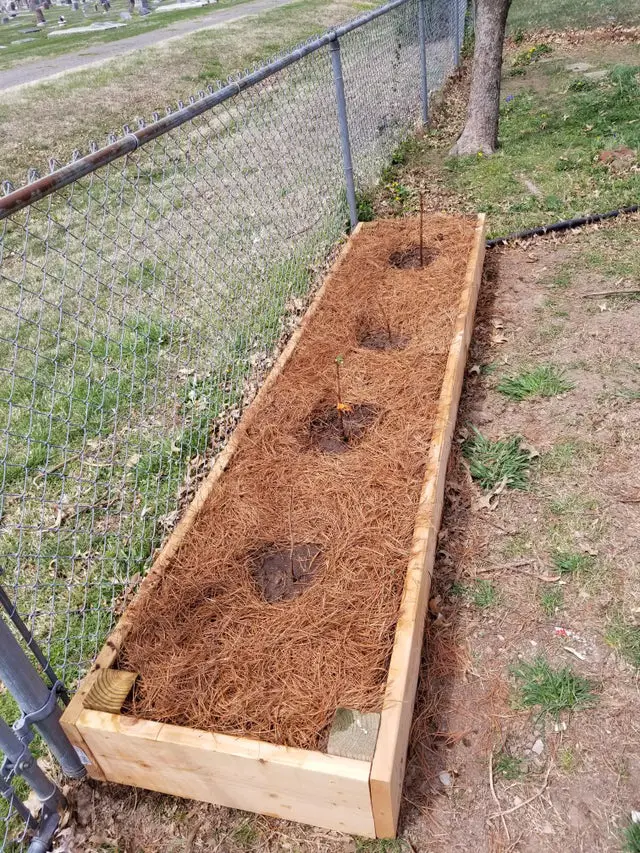
Raspberries are the kind of plant which likes to grow best in areas with cool summers and relatively mild winters. This plant is quite sensitive to high temperatures, the best temperature for growing juicy fruit is about 25°C or 77°F.
It depends, which climate you are living in. You can start raspberries with one-year-old canes which you can buy from a local nursery in your area. You can plant the raspberries in early spring when the soil becomes warm. As you are growing in a raised bed you can plant earlier and get mature fruit early.
For mild areas, raspberry plants can be planted in late autumn to give a head start. The potted plants can easily transplant in your raised bed after passing the last frost.
CHOOSE THE BEST SITE FOR YOUR RAISED BED AND PREPARATION FOR PLANTING
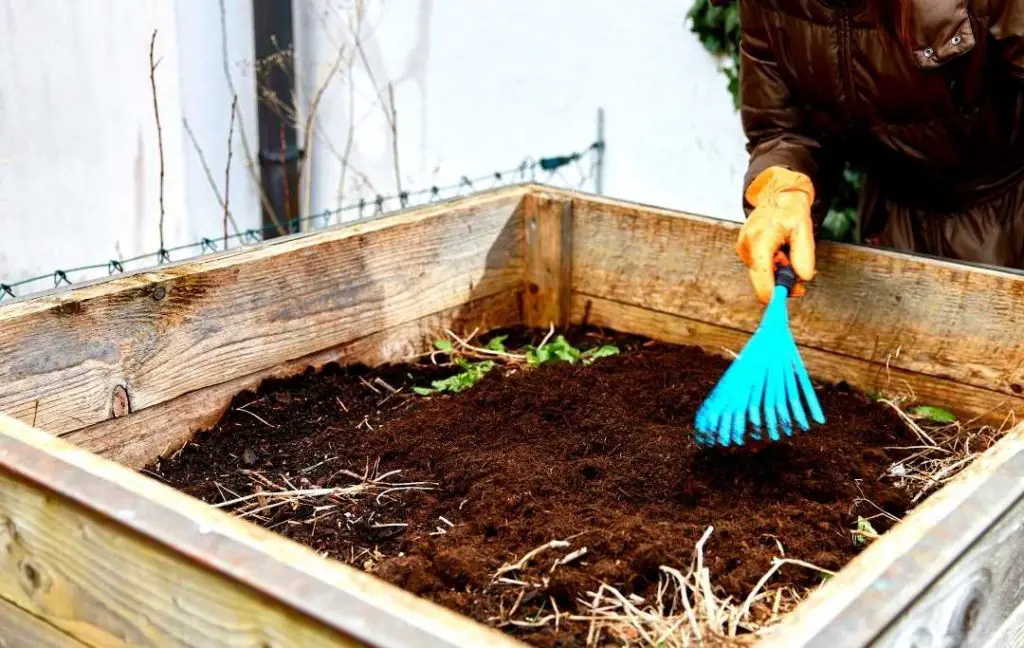
Choose the best sunny location for your raised bed as raspberries like to grow in sunny spots. If you are building your raised bed then select the spot which gets full sun exposure but unlike other fruits, raspberry plants can grow successfully in partial shade. But remember more sun results in more fruit.
Fill the raised bed with well-drained and sandy soil. Your soil should be rich in organic matter, if you see any deficiency in your soil then you can add well-aged compost or manure but a few weeks before planting.
Never add fertilizer to the raised bed close to your planting date. You need to mix ½ lb – ¾ lb 10-10-10 per 100 sq before 2-3 weeks to planting. The pH of the soil must be 6.5 to 6.8.
RASPBERRY SPACING IN RAISED BED
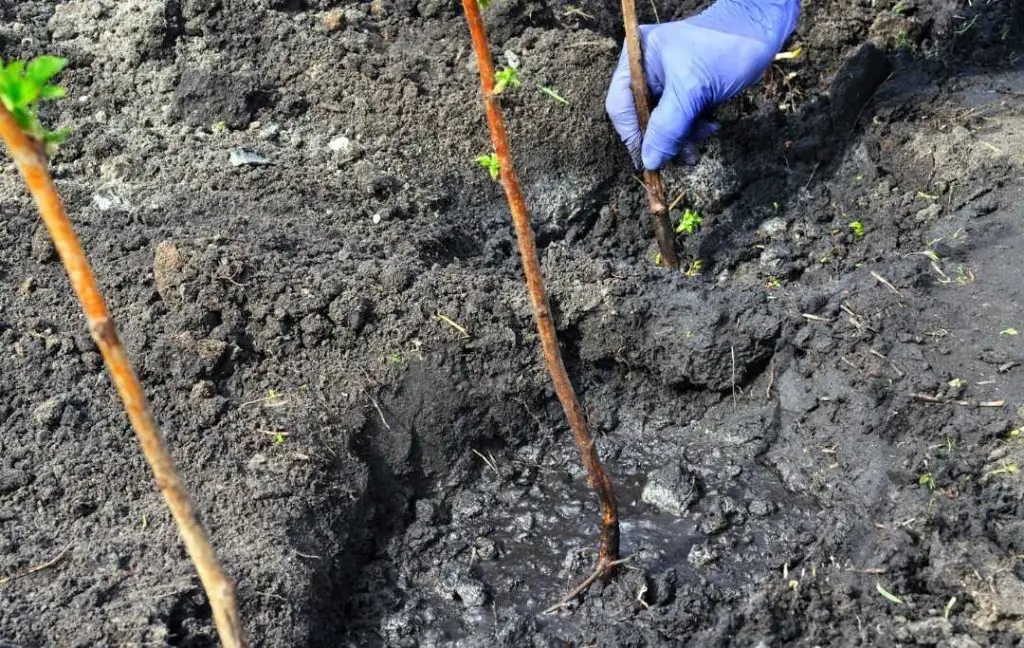
For easy planting, you can buy raspberries as bare-root plants or occasionally pots. The roots should be attached to the cane about an inch below the surface of the soil.
The depth in the raised bed of potted raspberries should be the same as in the pot. If you plant them more deeply, in that case, your plant will have to do more struggle.
The space between two plants of berries must be 3 feet. The width of the raised bed is at least 3 feet. The roots of raspberry plants need ample space for them to continue spreading.
HOW TO PLANT RASPBERRIES?
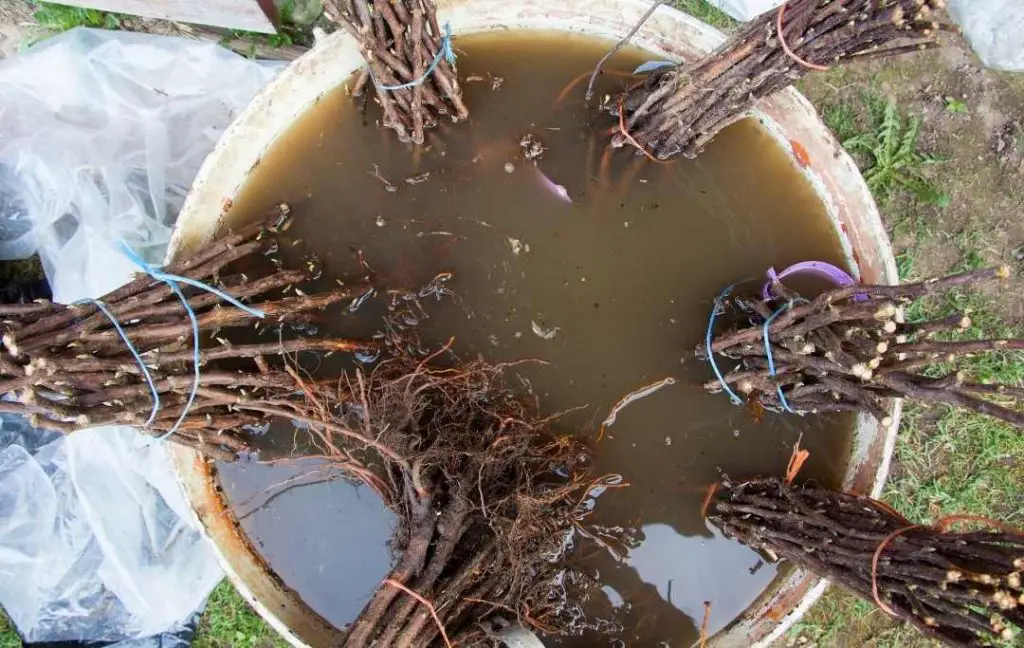
- Soak the roots in water for at least one hour before planting. This will help to speed up the growing process and it will help to adjust to a new environment.
- According to the roots of the can dig holes in the raised bed so roots find ample room for spreading.
- The crown of the plant should be kept one or two inches above the ground.
- Fill the hole with soil after placing the plant. Tamp the soil down.
- When your canes are planted then it is a time to cut them down to encourage new growth. The look of them is just like broken branches sticking in the raised bed.
- If you are growing summer bearing variety then it needs proper support. Their canes are long and weak so you should install a strong structure for providing support to your sweet treasure. For this purpose, you can use our trellis.
HOW TO CARE FOR YOUR RASPBERRIES?
- Your raspberry plants need moisture. You can spread a layer of mulch on the soil so it can retain moisture and protect your plants from weeds. Weeds are unwanted plants and they can steal all the nutrients from the soil.
- Your raspberry plants need 1 inch of water weekly. Infrequent deep soaking is not suggested to make sure your plants get regular water.
HOW TO PRUNE RASPBERRIES?
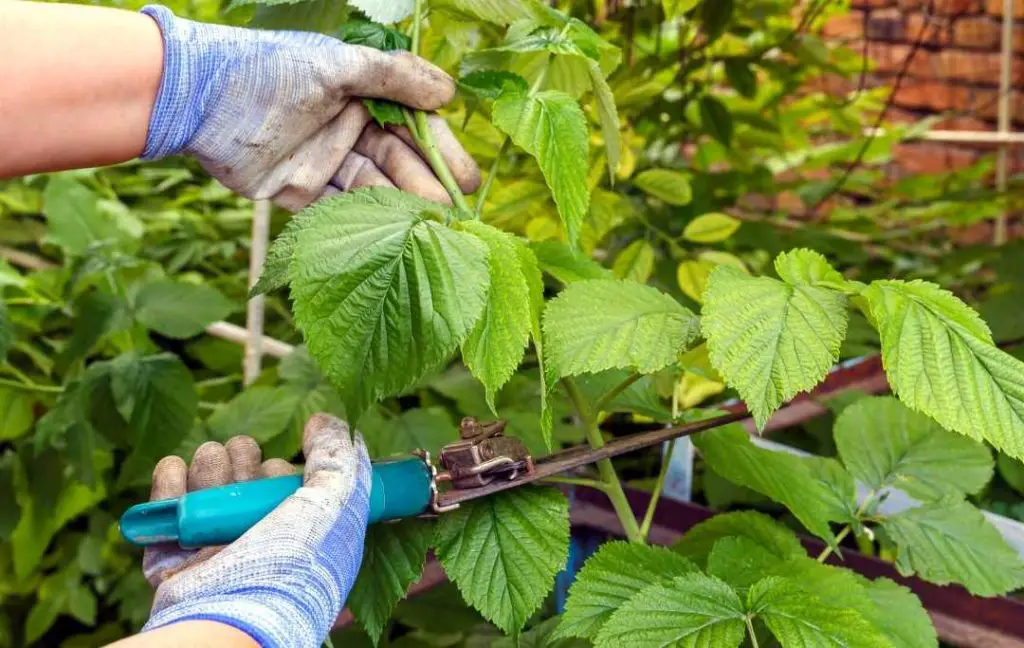
After picking the fruits prune your raspberry plants immediately. You should cut those canes which produce fruits.
Raspberry plants produce berries when their canes are two years old. The older can have brown stems while the young can is green you can easily recognize the older ones and prune them.
PESTS AND DISEASES
Pests and some diseases are a threat to getting healthy and juicy fruit. But raspberries are included in that category of fruits that are not bothered by pests and disease. Raspberries are the favorite of the Japanese beetles. You should keep an eye on the spider mites. They are also lovers of sweet treats.
Some diseases such as Cane Blight, Gray Mold, Spur Blight, and Yellow Rust are dangerous for your healthy crop.
HARVEST AND STORAGE
Remember all the varieties of raspberries start producing fruit in their second season. But in some cases, everbearing variety can bear small berries in the first autumn.
In the summer season, you will find the ripen berries over a time of about 2 weeks. You should pick berries every couple of days. Choose a sunny day for harvesting when they are dry. When the berries are completely ripe they leave the vine willingly there is no need to tug them too hard.
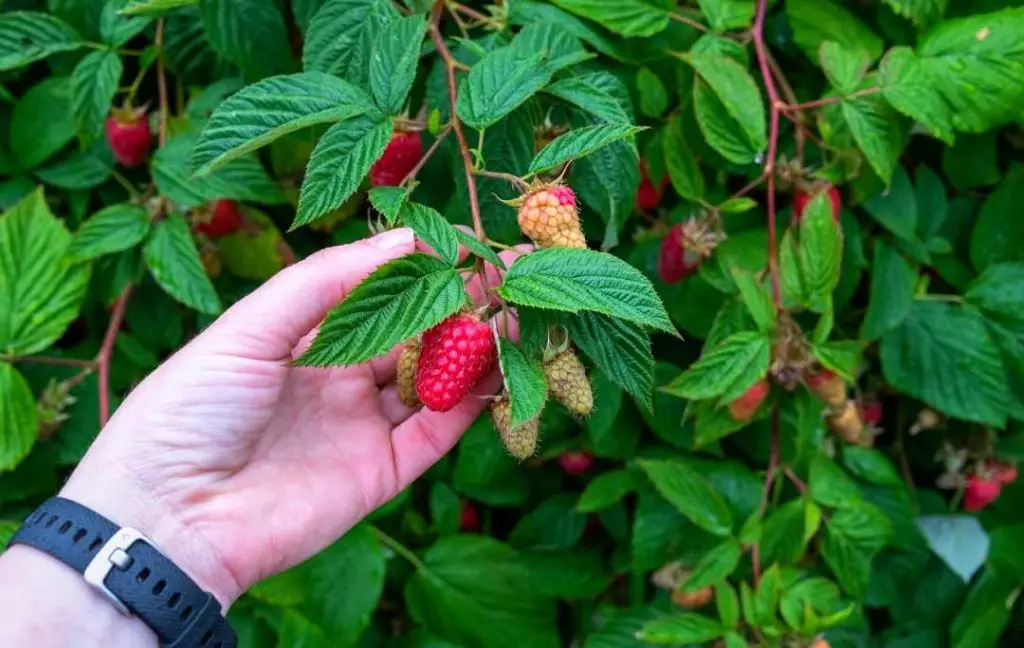
You can’t store raspberries for a long time after picking. They will not live more than five days in a refrigerator. Remember, don’t wash the berries after picking them, you should wash them when you want to eat them.
If you store them after washing them then they will grow moldy and mushy. If it is necessary to wash them then first let them dry in the air before storing.
It is better to eat fresh berries but you can also freeze raspberries. For this purpose, you can place them in an airtight bag. You can use them in different dishes. You can consume fresh raspberries for making jams, jellies, juices, and pulps.
Hope this article will help you in growing your favorite berries. Don’t be afraid of growing these juicy fruits because they are easier to grow than any vegetable. After reading this article you know the basics of growing raspberries in your raised bed.

